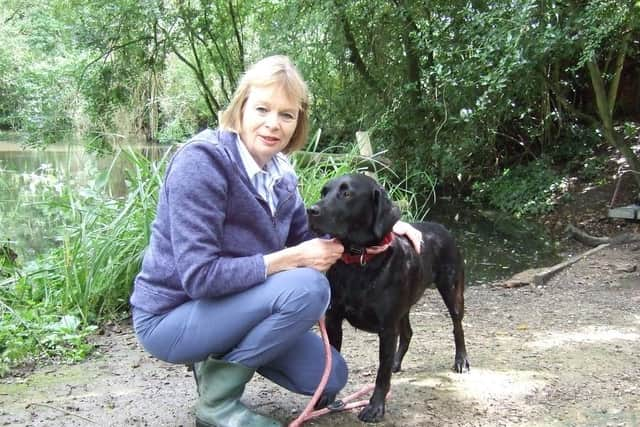Illegal pet breeding: Advice given to Chichester district residents as sales soar
and live on Freeview channel 276
People living in the Chichester district are being reminded of the importance of using licensed breeders when buying a kitten or puppy.
A new law introduced last year banned third party sales of puppies and kittens and buyers are now entitled to see the animal interacting with their mother in their place of birth when the animal is offered for sale.
Advertisement
Hide AdAdvertisement
Hide AdThe hope is that this new law will prevent illegal puppy and kitten farms.


Penny Plant, cabinet member for environment and Chichester contract services said: “Over lockdown many people across the UK have been looking for a furry companion, with 2 million dogs purchased in 2020.
“This has led to the price of puppies rising by upwards of 134 per cent. This sharp increase in demand has led some of our residents to fall victim to illegal breeders and scams.
“Our team at Chichester District Council has received a large number of complaints from members of the public who have purchased animals from these illegal breeders. In many cases the animals suffer from nasty illnesses; including cherry eye and parvovirus, to name but two.
Advertisement
Hide AdAdvertisement
Hide Ad"These illnesses are distressing for both the animal and the owner, and can be extremely expensive to cure.
“In response to these complaints our team has been heading out into the district to investigate instances of illegal puppy and kitten sales and bringing them in line with the law. We’ve urged a good number of dog breeders to apply for a licence and, thanks to the new law, we’ve been able to carry out regular, unannounced, inspections to make sure standards are maintained.
“We know that some residents are unsure how to tell if a breeder is licenced or not and so we’ve created a list which gives people tips on how to spot these illegal businesses.
“We are urging the public to get in contact with us through our website here: www.chichester.gov.uk/article/31154 if they suspect a breeder of not following the law. Some businesses will not be aware that they need a licence, and some may be in the process of applying.
Advertisement
Hide AdAdvertisement
Hide Ad"However, some people may be aware they need a licence and have chosen not to apply. It is that latter category that we need to find and investigate. We’ve been very busy over the past 18 months and it is our priority that puppies and kittens are purchased legally and safely.”
Ralph Walling, principal environmental health officer, has been one of the officers investigating unlicensed breeders in the district.
He said: “The majority of unlicensed breeders we meet are unaware of the regulations and are happy to cooperate and improve their standards.
"However, because the price of pets; especially puppies, has risen dramatically during the pandemic, organised criminals have begun to mistreat animals and take advantage of people.
Advertisement
Hide AdAdvertisement
Hide Ad“These criminals either breed animals in a horrible environment, keeping them in dirty and cramped conditions, or they just scam people out of money. That’s why it’s very important that residents buy pets from licenced breeders and ask to see the puppy or kitten and their mother in their home environment.
“Criminal breeders will often give the excuse that they can’t let you see the mother because they are somewhere else and they won’t say where, or because of COVID. When residents buy dogs from these breeders, the pet is often sick or poorly socialised, which can mean long-term expense and heartache for a new owner.
"We’ve heard examples of people paying a deposit on-line for pets that don’t even exist and they end up losing their money. It’s also important to remember that when you buy from these groups you are helping to fund organised crime, which of course has a huge effect on the district and the country.”
Chichester District Council has published the following advice for residents seeking to distinguish licensed and unlicensed breeders:
Advertisement
Hide AdAdvertisement
Hide Ad• meet the seller at the animal’s home, and make sure that the mother and rest of the litter are present before agreeing to a purchase;
• always see the animal interacting with its mother and siblings. When you see the animal they should be sociable and alert, they should not look nervous or dirty;
• dishonest sellers will often suggest meeting in a location that is convenient to you, such as your home, somewhere nearby, or a halfway point, to avoid showing you the animal’s living conditions;
• do not pay a deposit before you’ve seen the puppy in person;
Advertisement
Hide AdAdvertisement
Hide Ad• a licensed breeder will be able to show you their licence certificate. If you are unsure, you should contact the local authority to check the details;
• a good breeder will not say that they have misplaced documents or promise to send them later;
• a responsible seller will want the puppy to go to a good home. They should be engaged and asking you questions to assess your suitability as an owner;
• check vaccination and health records, details of the microchip record and details of worming and flea treatment; a licensed breeder will provide you with all this information
• do not feel under pressure to buy the animal; and
• if you are at all unhappy about the situation or the conditions that the animal and its mother are in, do not buy the animal and report your concerns to the local authority.